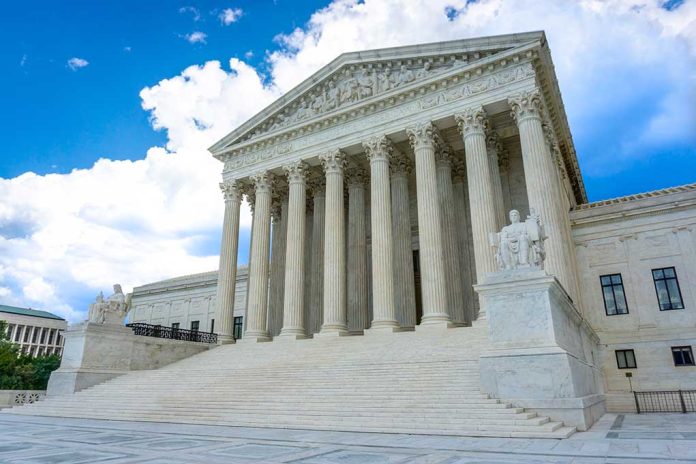
The Supreme Court’s refusal to hear a challenge to California’s ban on gun shows on state property has sparked outrage among Second Amendment advocates, leaving crucial constitutional questions unanswered.
Key Takeaways
- The Supreme Court declined to review B&L Productions v. Gavin Newsom, effectively upholding California’s ban on gun shows on state property.
- Critics claim Chief Justice Roberts and Justice Barrett are undermining Second Amendment protections.
- Justice Clarence Thomas previously emphasized strong constitutional protections for gun rights in a 2022 ruling.
- The decision allows the 9th Circuit Court of Appeals ruling in favor of California’s restrictions to stand.
- Gun rights advocates argue the ruling contradicts the Second Amendment’s explicit language that the right “shall not be infringed.”
Supreme Court Declines to Challenge California’s Gun Show Ban
The U.S. Supreme Court has declined to hear a case challenging California’s ban on gun shows on state property, effectively allowing the restriction to stand. The case, B&L Productions v. Gavin Newsom, sought to overturn a law prohibiting firearms exhibitions on state-owned properties. This refusal to review the case has dealt a significant blow to Second Amendment advocates who hoped the high court would defend constitutional gun rights against what they view as California’s increasingly restrictive regulations. The 9th U.S. Circuit Court of Appeals had previously upheld the ban, and the Supreme Court’s decision not to intervene means that ruling remains in effect.
Oh shocker. No Snope or Ocean State on the SCOTUS Orders LIst (again). But the B&L Productions case from California was denied. So,we play on. pic.twitter.com/qdvKKDtpVb
— WashingtonGunLaw (@GunWashington) April 28, 2025
Roberts and Barrett Under Fire from Gun Rights Supporters
The decision has intensified criticism of Chief Justice John Roberts and Justice Amy Coney Barrett from constitutional conservatives who believe they are failing to defend Second Amendment protections. Many gun rights supporters had hoped that justices appointed during the Trump administration would strengthen protections for firearms ownership. Instead, critics argue that the court’s decision represents an abandonment of constitutional principles in favor of allowing state restrictions to persist. The rejection of the case stands in stark contrast to the court’s previous ruling in New York State Rifle & Pistol Association v. Bruen (2022), where Justice Clarence Thomas emphasized the historical importance of the right to bear arms.
“For months, high-ranking Government officials placed unrelenting pressure on Facebook to suppress Americans’ free speech. Because the Court unjustifiably refuses to address this serious threat to the First Amendment, I respectfully dissent,” remarked Justice Alito. While Justice Alito’s quote refers to a different case involving First Amendment rights, critics draw parallels between what they see as the court’s reluctance to defend constitutional freedoms across multiple fronts. Gun rights advocates argue that the court is showing a pattern of deference to state restrictions that fundamentally undermine the Bill of Rights, which they stress was designed to limit government power, not grant permissions from government to citizens.
California’s Restrictions and Constitutional Conflicts
California has enacted some of the nation’s strictest gun control measures, and the ban on gun shows on state property represents part of the state’s broader approach to limiting firearms access and visibility. Defenders of the law argue that the state has legitimate interests in regulating how its property is used and maintaining public safety. However, critics maintain that preventing legal gun shows on public property infringes on both Second Amendment rights and commercial speech protections. They point to the explicit language of the Second Amendment stating that the right to keep and bear arms “shall not be infringed” as a clear prohibition on such restrictions.
The court’s decision not to review the case leaves unresolved questions about how far states can go in restricting gun-related activities on public property. For gun rights advocates, the decision represents further erosion of constitutional protections in a state already known for its extensive firearms regulations. Critics argue that such restrictions primarily impact law-abiding citizens while doing little to address criminal behavior involving firearms. They emphasize that the Bill of Rights was designed specifically to protect fundamental liberties from government overreach, even when that overreach claims to serve public interests.
Looking Forward: The Battle for Second Amendment Rights Continues
The Supreme Court’s refusal to hear this case does not end the broader legal struggle over Second Amendment rights in California and nationwide. Gun rights organizations have indicated they will continue challenging what they view as unconstitutional restrictions through other cases and approaches. The decision highlights the ongoing tension between judicial conservatism that emphasizes restraint in overturning state laws and originalist interpretations that prioritize constitutional text and historical understanding. While California’s ban on gun shows will remain in place for now, the battle over the scope and meaning of the Second Amendment continues in legislatures and courtrooms across the country.
Sources:
SCOTUS Betrays Again – This Time Sides with California Against Gun Owners
Supreme Court won’t hear challenge to California ban on gun shows on public land







